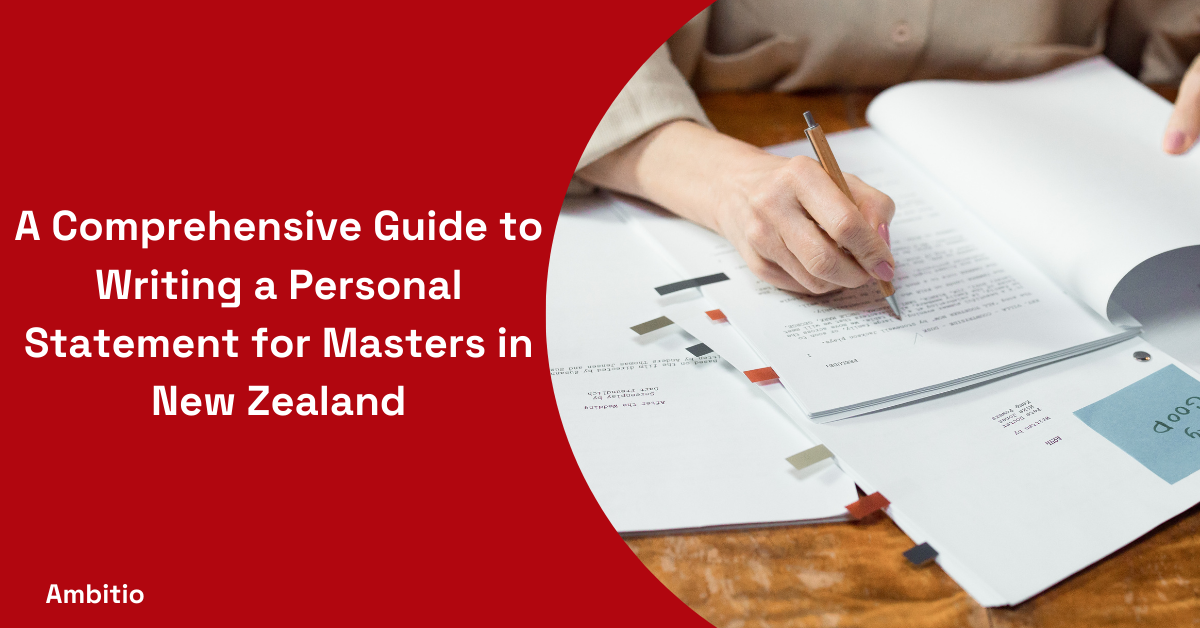12 April 2025
4 minutes read
A Comprehensive Guide to Writing a Personal Statement for Masters in New Zealand

Key Takeaways:
- A personal statement for masters in New Zealand is key to standing out in a competitive application process by highlighting your academic background and career goals.
- Tailor your statement to the specific program and university, emphasizing how the education will help you achieve your aspirations.
- Avoid clichés and ensure clarity in addressing your goals. Seek assistance to refine your personal statement and enhance its impact.
Writing a personal statement for masters in New Zealand can make or break your application. With hundreds of applicants vying for limited spots, a strong statement of purpose (SOP) is your opportunity to stand out. But many students struggle to write a concise and genuine statement that reflects their academic background, relevant work experience, and career aspirations.
Crafting a personal statement that aligns with the requirements of a specific university in New Zealand is crucial. Focus on demonstrating your passion, motivation, and unique qualifications. By highlighting your achievements and tailoring your application to each program, you can make your personal statement stand out and increase your chances of admission.
Why Your Personal Statement for Masters in New Zealand Matters?
Your personal statement for masters in New Zealand is a crucial part of the application process. It’s your chance to communicate why you’re the ideal candidate for the program and why you want to study in New Zealand. A well-crafted statement can ensure you stand out in the competitive graduate school application pool. With expert tips for writing a compelling document, you can highlight your academic qualifications, knowledge, and diverse experiences. Whether applying for a student visa or aiming to contribute to a particular university’s community, a strong personal statement helps achieve your goal of securing a master’s degree.
Key Elements to Include in Your Personal Statement for Masters in New Zealand
When writing your personal statement for masters in New Zealand, it’s important to include key elements that highlight your qualifications and aspirations.

Here’s what to focus on:
- Clear Purpose: Explain why you’ve chosen a specific program in New Zealand and how it aligns with your educational goals and career aspirations.
- Academic Background: Showcase your relevant academic qualifications and how they contribute to your postgraduate ambitions.
- Why This University: Highlight why you’ve selected this particular university and how it fits your aspirations.
- Personal Achievements: Discuss your achievements and a diverse range of experiences that make you a strong candidate.
- Concise and Creative Writing: Ensure your written statement is clearly written, well-structured, and effectively communicates your motivation and fit for the program.
- Future Goals: Demonstrate how this program will help you achieve your goals and contribute to your chosen field.
- Complete Application: Ensure that your personal statement complements your university applications, helping you stand out in the competitive admissions process.
Common Pitfalls to Avoid in Your Personal Statement for Masters in New Zealand
When writing your personal statement for masters in New Zealand, avoid these common pitfalls to ensure your application stands out:

The application process can vary from one university to another, but these tips will ensure that your statement is both compelling and focused on what New Zealand’s top colleges are looking for.
- Overly Long or Short: Avoid exceeding the recommended length. Keep your statement concise and focused to make a strong impact.
- Lack of Specificity: Don’t generalize your reasons for choosing the program or destination. Tailor your statement to the particular institution and program you’re looking to pursue.
- Failure to Address Your Aspirations: Failing to clearly communicate your career goals and how the education you’ll receive will help you achieve them can weaken your statement.
- Clichés and Generic Phrases: Avoid using common phrases that don’t demonstrate your unique experience or passion.
- Ignoring the Competition: Make sure your personal statement highlights what makes you stand out in a competitive field. Aim to show the officer why you’re the right candidate.
- Neglecting Assistance: If needed, seek assistance in proofreading and refining your personal statement to ensure clarity and precision.
10 Top Universities to Study Masters in New Zealand
New Zealand is quickly becoming a sought-after destination for international students looking to pursue Masters. With its world-class education system, cultural diversity, and strong focus on global business, New Zealand offers Masters programs that are both academically rigorous and industry-focused.
Many top universities in New Zealand offer MBA programs that are highly regarded globally, with graduates going on to successful careers in various fields such as management, finance, and entrepreneurship. Here are the top 10 universities to study MBA in New Zealand:
| University | Average Tuition Fees (NZD) | Average Salary (NZD/year) | Exams Required |
|---|---|---|---|
| University of Auckland | 45,000 – 50,000 | 90,000 – 110,000 | GMAT, IELTS/PTE |
| University of Otago | 38,000 – 42,000 | 85,000 – 100,000 | GMAT, IELTS/PTE |
| Victoria University of Wellington | 38,000 – 40,000 | 80,000 – 95,000 | GMAT, IELTS/PTE |
| Auckland University of Technology | 35,000 – 40,000 | 80,000 – 95,000 | GMAT, IELTS/PTE |
| University of Waikato | 35,000 – 40,000 | 75,000 – 90,000 | GMAT, IELTS/PTE |
| Massey University | 30,000 – 35,000 | 70,000 – 85,000 | GMAT, IELTS/PTE |
| Lincoln University | 30,000 – 35,000 | 70,000 – 85,000 | GMAT, IELTS/PTE |
| AUT Business School | 35,000 – 40,000 | 80,000 – 95,000 | GMAT, IELTS/PTE |
| University of Canterbury | 35,000 – 40,000 | 75,000 – 90,000 | GMAT, IELTS/PTE |
| Eastern Institute of Technology | 30,000 – 35,000 | 65,000 – 80,000 | IELTS/PTE |
Conclusion
Your personal statement for masters in New Zealand is your chance to successfully showcase your aspirations, qualifications, and motivations for pursuing further education. A well-crafted paragraph can make a significant impact on your university application, helping you stand out in a competitive environment. Take the time to reflect on your goals and tailor your statement to highlight what makes you an ideal candidate.
At Ambitio, we offer expert assistance to ensure your personal statement aligns perfectly with your dreams. Let us help you craft a statement that secures your spot in a top university in New Zealand!
FAQs
What is a personal statement, and why is it important for a master’s application in New Zealand?
A personal statement explains your motivations and career goals, helping admissions committees assess your fit beyond grades. It showcases your passion and how the program aligns with your career trajectory.
What key elements should be included in a personal statement for a master’s program?
Include motivation, academic background, professional experience, university choice, and career goals. Tailor these elements to the specific program and university.
How long should the personal statement be?
Typically between 500 to 1,000 words, depending on the university’s requirements.
What makes a personal statement for New Zealand unique compared to other countries?
Emphasize adaptability to a multicultural environment and how the program supports post-study work opportunities in New Zealand.
What are common mistakes to avoid when writing a personal statement?
Avoid generic statements, irrelevant information, and exceeding word limits.
How can I make my personal statement stand out?
Use a strong introduction and specific examples that align with your career goals and the program.
Should I include extracurricular activities in my personal statement?
Yes, include relevant extracurricular activities that demonstrate applicable skills or leadership.

You can study at top universities worldwide!
Get expert tips and tricks to get into top universities with a free expert session.
Book Your Free 30-Minute Session Now! Book a call now




























